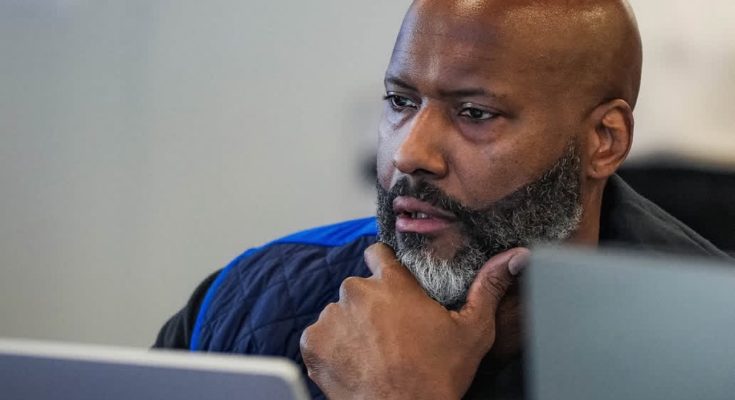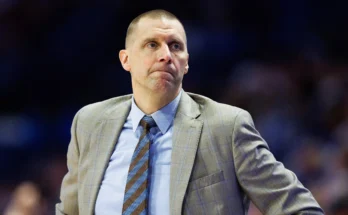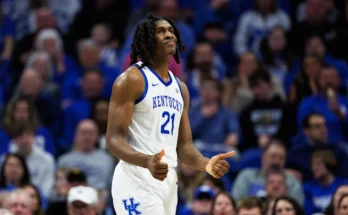Brad Holmes Quietly Transformed the Detroit Lions from Perpetual Rebuilders into a Ferocious, Fearless Contender Built to Last for Years
For decades, the Detroit Lions were the NFL’s forgotten child — a franchise mired in mediocrity, tangled in false starts, endless resets, and shattered hopes. Fans clung to memories of Barry Sanders and Calvin Johnson, both generational talents who never tasted true postseason glory. The narrative was always the same: too little, too late. Too many mistakes. Too little direction. Too little heart. But that script — once so tragically familiar — has been torn to shreds. And the pen that rewrote it? It belongs to Brad Holmes.
Holmes arrived in Detroit in 2021 without flash, without a catchy slogan, and without the media fanfare that typically follows a new general manager. He wasn’t a soundbite. He was a blueprint. Methodical. Grounded. Relentlessly focused. Holmes didn’t promise miracles — he promised alignment. Alignment between front office and field. Between scouting and development. Between vision and execution. And in just a few seasons, that vision has blossomed into one of the most formidable organizations in football.
The seeds of the transformation were planted early — and they were planted deep. Holmes didn’t chase headlines. He chased culture. And his first big swing came in the form of a towering, nasty, technically sound offensive lineman from Oregon. Penei Sewell wasn’t just a smart pick — he was a tone-setter. A relentless, fearless mauler who embodied everything Holmes and head coach Dan Campbell wanted this team to be. Sewell walked into the locker room and changed the temperature. He didn’t talk. He imposed. He set standards. He demanded excellence. And Holmes’ rebuild had its anchor.
But that was just the beginning. In 2022, the Lions held the No. 2 overall pick. There was no drama. No hesitation. Aidan Hutchinson, the Michigan native with the motor of a machine and the mindset of a champion, was the obvious choice. And once again, Holmes was dead-on. Hutchinson didn’t just bring sacks. He brought an attitude. He became the heart of a surging defense. Around him, Holmes drafted pieces that fit like puzzle parts. Jameson Williams, an explosive wideout with game-breaking speed. Josh Paschal, Kerby Joseph, Malcolm Rodriguez, James Houston — a mix of athletes, enforcers, and quiet killers, all of them contributors. It wasn’t just a good draft. It was a statement of purpose.
Then came 2023 — the year the football world finally stopped underestimating Brad Holmes. When he selected running back Jahmyr Gibbs and linebacker Jack Campbell in the first round, the critics pounced. The narrative was predictable: outdated positional value, reaching for need, ignoring analytics. But Holmes wasn’t building a fantasy team. He was building a real one. And when the dust settled, the results silenced everyone. Gibbs was electric — a home-run threat every time he touched the ball, with burst and vision that tormented defenders. Campbell was steady and instinctive, a throwback linebacker with new-age athleticism. But it was Day 2 where Holmes truly shined. Sam LaPorta, the Iowa tight end, became a breakout star. Brian Branch, the Alabama safety and nickel corner, played like a veteran from Day 1 — a brutal hitter with elite instincts and positional versatility. Brodric Martin and other late picks added needed depth. And suddenly, Holmes wasn’t just drafting players. He was crafting an identity.
Yet for all the focus on his draft wizardry, Holmes’ masterpiece might be the move that no one respected at first — trading for Jared Goff. At the time, Goff was viewed as a contract albatross. A placeholder. A throw-in to facilitate Matthew Stafford’s departure to Los Angeles. But Holmes saw something others didn’t. He’d known Goff since their days in Los Angeles. He understood the mindset, the work ethic, the competitive fire. And over time, Goff rewarded that faith with growth, maturity, leadership — and wins. By 2023, Goff had evolved from castoff to captain, the calm center of an offense loaded with young firepower.
Holmes didn’t stop there. He surrounded Goff with smart, cost-effective veterans like David Montgomery, C.J. Gardner-Johnson, and Cam Sutton. He re-signed the players who’d proven their value — from Alex Anzalone to Isaiah Buggs to Frank Ragnow. He retained the core, rewarded the right behavior, and never lost sight of the balance between youth and experience, star power and role players. Every signing made sense. Every departure had rationale. There was no guesswork. No flailing. Just strategy.
And critically, everything Holmes built complemented the spirit of head coach Dan Campbell. Campbell’s philosophy — toughness, unity, resilience — needed players who weren’t just talented, but bought in. Holmes provided them. Again and again. Guys who loved football. Guys who didn’t blink in the cold or flinch when down double-digits. Guys who didn’t care about Pro Bowls — only playoffs. Together, Holmes and Campbell crafted a team that reflected the best of Detroit: hard-working, no-nonsense, underdog mentality, built on grit.
The payoff has been undeniable. In 2023, the Lions won the NFC North — something that hadn’t happened since the division was realigned. They didn’t sneak in through the wild card. They kicked the door down. Then they won a playoff game. Then another. And for a moment, the unthinkable became thinkable: the Lions, long cursed and mocked, were one win away from the Super Bowl.
But it wasn’t a fluke. That was the point. This wasn’t a one-year flash or a lucky bounce. It was the culmination of layered roster-building, elite scouting, forward-thinking contracts, and a shared philosophy from the front office down to the practice field. The Lions were built — not bought.
Even in moments of setback or scrutiny, Holmes stayed true. When a few high-profile free agents didn’t work out, there were no panicked trades or desperate replacements. He leaned on depth. On coaching. On culture. And the team responded. Because Holmes hasn’t just assembled talent — he’s built belief.
In a league that changes fast, sustainability is everything. And Holmes has prioritized it. Draft picks matter. Development matters. Relationships matter. He hasn’t swung wildly for fading stars or burned through cap space in free agency frenzies. He’s been patient, yet aggressive when the moment calls. Calculated, yet open to evolution. A GM who knows that success isn’t just about the next game — it’s about the next five years.
In the process, Holmes has transformed Detroit from an NFL punchline into a respected power. He’s not loud. He doesn’t go viral. He doesn’t leak rumors or chase buzz. But his fingerprints are all over the best era of Lions football in living memory. The Ford family believed in him. The city has embraced him. And around the league, rival GMs are watching, learning, and — whether they admit it or not — taking notes.
Today, Lions fans don’t have to dream blindly. They have reasons. They have wins. They have a roster stacked with talent, with more on the way. They have a coach who commands the room and a GM who owns the blueprint. Most of all, they have something that has eluded them for generations: hope backed by proof.
Brad Holmes didn’t bring a magic wand to Detroit. He brought a plan. A detailed, disciplined, deliberate plan to build a winner. And in a town that knows what it means to fight for everything, Holmes has given them a team worthy of their loyalty.
He didn’t just build a roster. He built a movement.
He didn’t just restore pride. He rewrote the legacy.
He didn’t just give Detroit a shot at winning —
He made them believe they could never stop.



